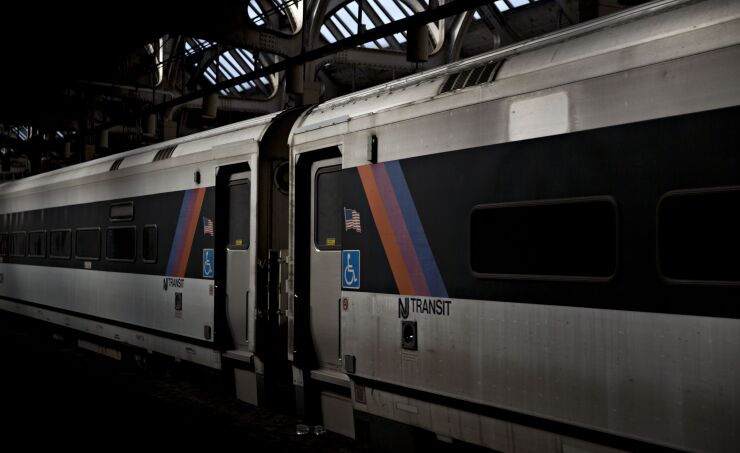New Jersey Transit’s newly released long-range
The nation's largest statewide public transportation system unveiled a $16.985 billion five-year capital program that identified $11.2 billion of available resources from state and federal funds.

The $5.7 billion funding gap, many New Jersey transportation advocates say, underscores the importance of more state support for trains and buses.
A coalition of transportation and environmental groups is calling on Gov. Phil Murphy’s administration to reprogram New Jersey Turnpike Authority toll revenues toward NJ Transit’s capital needs instead of strictly for highway expansion.
The group, which includes the Regional Plan Association and Tri-State Transportation Campaign, urged Murphy and New Jersey Department of Transportation Commissioner Diane Gutierrez-Scaccetti to prioritize NJ Transit investments over roadway improvements in the state agency's newly enacted
“We see this as being a plausible approach,” said Nat Bottigheimer, the RPA’s New Jersey director, on efforts to steer NJTA toll revenues toward NJ Transit’s capital program. “NJ Transit’s capital needs need to be put in the context of a statewide transportation plan.”
NJ Transit’s unbudgeted capital plan is highlighted by the goal of elevating its Hoboken rail terminal to protect against flooding. The agency is also looking to repair or replace aging rail bridges along with rolling out multi-level trains and electric buses.
NJTA commissioners voted last month to raise tolls 36% on the New Jersey Turnpike and 27% on the Garden State Parkway to help finance $24 billion in planned construction projects over the next 20 years. The NJTA’s first toll increase in eight years also included initial approval for plans to raise toll rates annually starting in 2022 at an undetermined index with a 3% annual cap.
New Jersey has had a long practice of diverting NJTA revenues toward NJ Transit to cover operating needs including $129 million in the current 2020 fiscal year budget.
Janna Chernetz, senior New Jersey policy analyst for the Tri-State Transportation Campaign, said reprogramming some of NJTA’s new toll revenues toward NJ Transit rather than $16 billion of planned road widening projects would be a more sound transportation investment.
“Widening doesn’t fix congestion,” Chernetz said. “There are unfunded NJ Transit projects that should be prioritized over unnecessary ones.”
The coalition wants the NJTA proposal to be adopted in concert with another
“The pandemic has changed everything for at least the next year with regard to NJ Transit's budget needs,” Sweeney said in a statement noting that the agency is receiving $1.5 billion of federal funding under the CARES Act and is seeking additional aid from Washington to combat passenger revenue losses from the virus. “Clearly, when this federal money goes away, we are going to need to push forward to provide NJ Transit with dedicated operating funding it can count on like other transit agencies around the country.”
Chernetz said increased dedicated state revenue for NJ Transit would enhance capital planning efforts by preventing diversions of capital funds to plug operating budget shortfalls. She said there have been $11 billion in capital-to-operating transfers since the early 1990s including $460 million in the current fiscal year.
Kevin Corbett, NJ Transit’s executive director, said during a June 8 media briefing that he hopes the $5.8 billion of unfunded capital plan coupled with the agency’s first 10-year strategic plan urges lawmakers to rally behind funding efforts.
“It really helps galvanize businesses, civic groups, environmental groups, to help that advocacy for the funding, both at the federal level with our congressional delegation, as well as working with the Legislature to help get dedicated funding for New Jersey Transit,” Corbett said. “We have to live with a certain financial reality, but I think when you see what it takes to be a first-class system, this is what it's going to take over a period of time.”
Corbett and Murphy both called for increasing federal funding to allow NJ Transit to tackle its capital program. Murphy spokesman Darryl Isherwood there are no plans to seek borrowing for NJ Transit under the New Jersey COVID-19 Emergency Bond Act proposal that
A past history of structurally imbalanced budgets and rising pension liabilities have driven New Jersey’s credit rating to second worst of the 50 U.S. states ahead of only Illinois. Fitch Ratings downgraded New Jersey GO to A-minus from A in April citing the state’s lack of reserves to combat a severe economic downturn. New Jersey is rated A3 by Moody's Investors Service, A-minus by S&P Global Ratings and A by Kroll Bond Rating Agency.
Corbett sent a letter to New Jersey’s congressional delegation in May asking for $1.2 billion of
Chernetz said that while fighting for more federal rescue aid is important for NJ Transit’s near-term fiscal health, New Jersey lawmakers should not lose focus on the importance of developing a sustainable future funding formula.
“We have to keep this conversation going and not put it off because we had federal assistance,” she said. “The problem is not going to go away.”





